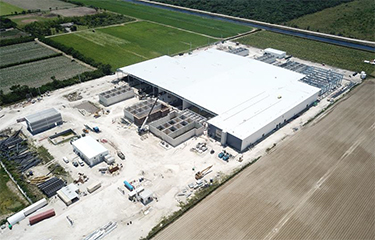Atlantic Sapphire has announced via a press release to the Oslo Stock Exchange that the company has been forced to initiate an emergency harvest for 200,000 salmon in its Miami, Florida, U.S.A.-based recirculating aquaculture system (RAS) facility.
The announcement, made on 28 July, said the emergency harvest was from one of the facility’s growout systems which was recently stocked “despite not being fully commissioned.” Other growout systems, Atlantic Sapphire said, were not affected.
In total, the close to 200,000 fish have a total weight of approximately 400 metric tons (MT) head-on, gutted (HOG). Approximately 150 MT HOG of that are “planned to be sent for processing and will be sold.” The fish that were harvested would have represented a harvest of 700 MT HOG when fully grown.
Atlantic Sapphire stated that the exact cause of the event are still being investigated.
“The exact chain of events is still being investigated, however, disruptive construction work close to the operating environment, including loud sounds and severe vibrations, stressed the fish,” Atlantic Sapphire wrote. “Additionally, recent challenges of delayed construction and commissioning, in part because of the COVID-19 pandemic impact, have resulted in increased risk in the operation at this time. There is no indication of intoxication or disease being the cause of this event.”
The company added that some systems are not fully built in its Miami-based “Bluehouse” – the name Atlantic Sapphire has given its RAS facilities. If the facility had been fully operational, the fish movement system that would have been in place “would likely have mitigated this event.”
The complete financial impact, according to the statement, is still unknown. The company had, earlier in 2020, planned for the first phase of construction on its massive land-based salmon farm to be completed by July.
Completing the commissioning of the facility, Atlantic Sapphire stated, has been a challenge. However, it also pointed out that the incident is a demonstration of why diversifying the growout facilities is important.
“This incident demonstrates the challenges of completing construction commissioning of all Bluehouse systems and support functions while in operation, but also the value and importance of having multiple independent systems to diversify biological risk,” the company stated. “Upon final completion of the US Phase 1 facility, with the expected annual output of around 10,000 tons (HOG) salmon per year, Atlantic Sapphire will have a total of twelve independent growout systems in the US, limiting the risk and financial impact of any systemic contamination to below 10 percent of total output and revenue.”
Atlantic Sapphire could not be reached for further comment on the incident.
Photo courtesy of Atlantic Sapphire







